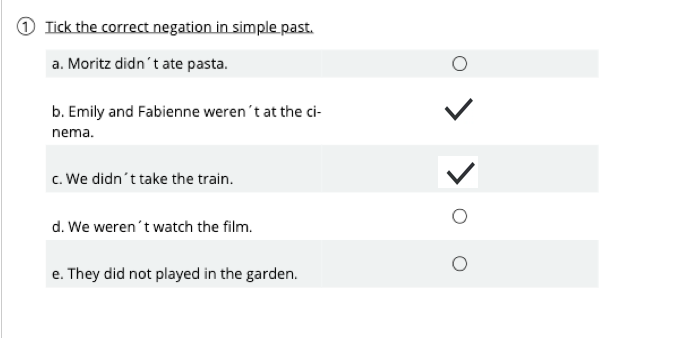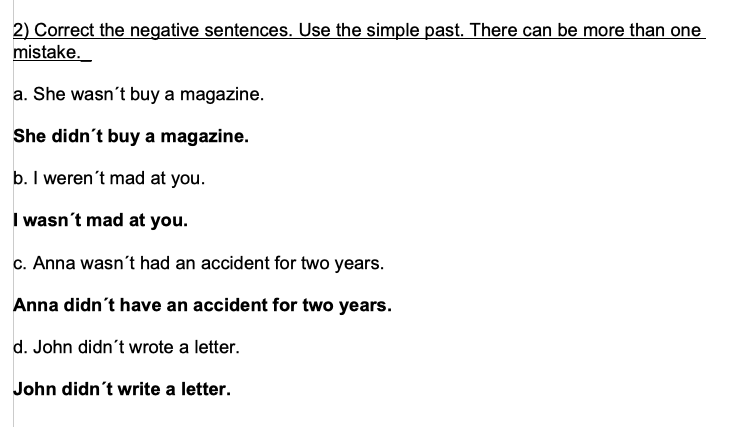Revision: the simple past 1

played
spielen
watched
schauen
looked
gucken
gucken
listened
zuhören
laufen
walked
gehen
went
flew
fliegen
got
bekommen
treffen
met
unterrichten
taught
https://editor.mnweg.org/nordsee-campus-wilhelmshaven/dokument/loes-the-simple-past
3) Complete the sentences with the correct form of the simple past.
a) Last week Emma met (meet) Cathy in town.
b) In 1997 we moved (move) to Frankfurt.
c) My father my brother watched (watch) TV last night.
d) I bought (buy) a new dress yesterday.
e) They tidied up (tidy up) their bedroom last Saturday.
4) Make sentences in the simple past:
a. my neighbour - have - an accident - yesterday.
My neighbour had an accident yesterday.
b. Ben - go - to school - last Monday.
Ben went to school last Monday.
c. Billy - stay - at home - last week.
Billy stayed at home last week.
d. We - be - at Kate´s house - on Friday.
We were at Kate´s house on Friday.
e. I - take - a shower - last night.
I took a shower last night.
https://editor.mnweg.org/nordsee-campus-wilhelmshaven/dokument/loes-the-simple-past
Revision: the simple past 2


https://editor.mnweg.org/nordsee-campus-wilhelmshaven/dokument/loes-the-simple-past
3) Translate the following sentences. Use the simple past.
a) Sie haben am Wochenende nicht ferngesehen.
They didn´t watch TV at the weekend.
b) Wir sind gestern nicht schwimmen gegangen.
We didn´t go swimming yesterday.
c) Samantha hat gestern kein Frühstück gemacht.
Samantha didn´t make any breakfast yesterday.
d) Wir haben am Wochenende nicht draußen gespielt.
We didn´t play outside during the weekend.
e) Ich habe gestern keine Hausaufgaben gemacht.
Yesterday I didn´t do any homework.
https://editor.mnweg.org/nordsee-campus-wilhelmshaven/dokument/loes-the-simple-past
Revision: the simple past 3
1) Read the answers and form the correct questions in the simple past:
a. they - at the station - did - arrive - when? - They arrived at 10.30 p.m .
When did they arrive at the station?
b. did - at the restaurant - eat - what - he? – He ate fish and chips.
What did he eat at the restaurant?
c) our team - did - against - play - Bristol - how? – We won 3:2.
How did our team play against Bristol?
d) go - did - where - your mother? – She went to the bakery.
Where did your mother go?
e) did - Clara - and Jaqueline - do - what? - They danced.
What did Clara and Jaqueline do?
__2) Write down questions with the verb to be in simple past and answer them.
a) Was Dave there, too? (yes)
Yes, Dave was there.
b)Were you late? (no)
No, we weren´t late.
c) Was she good? (yes)
Yes, she was good.
d) Were they at your house? (no)
No, they weren´t.
https://editor.mnweg.org/nordsee-campus-wilhelmshaven/dokument/loes-the-simple-past
3)Ask for the underlined word.
a) I went to the park.
Where did you go?
b) School started at 7.45.
When did school start?
c) They smiled because it was funny.
Why did they smile?
d) Bert played football yesterday.
What did Bert do yesterday?
e) Erika rode her bike yesterday.
Who rode her bike yesterday?
4) Translate the questions in the simple past.
a) Wo habt ihr euch getroffen?
Where did you meet?
b) Was hast du gesammelt?
What did you collect?
c) Warum hat sie die Hose gekauft?
Why did she buy the trousers?
https://editor.mnweg.org/nordsee-campus-wilhelmshaven/dokument/loes-the-simple-past


